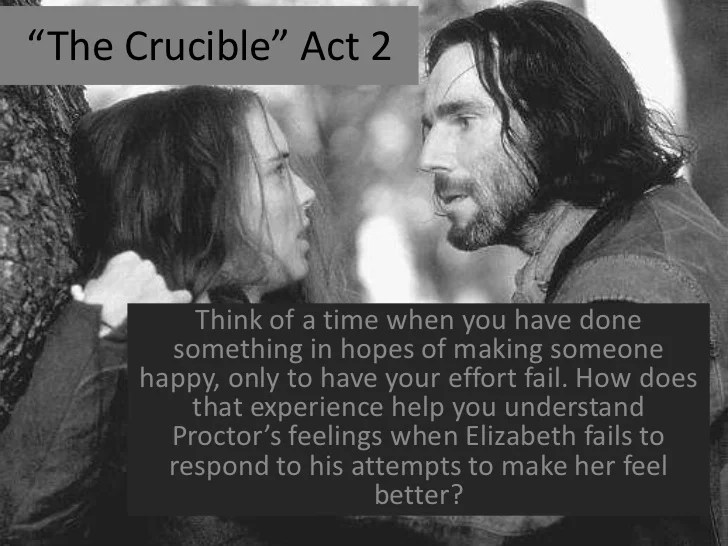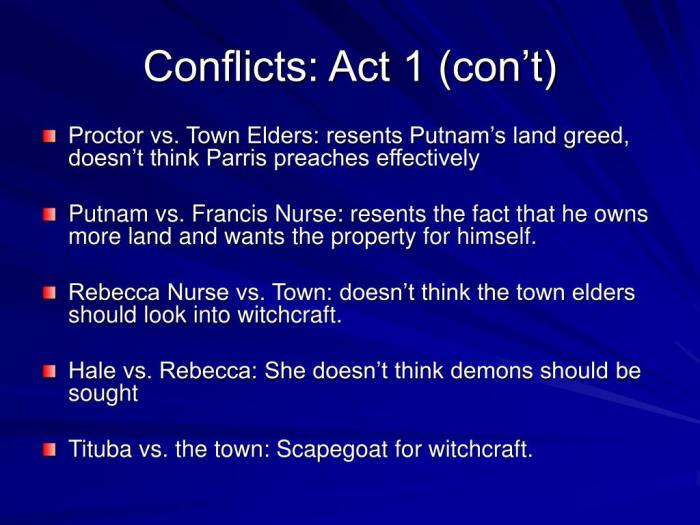Conflicts in the crucible act 1 – Journey into the heart of Arthur Miller’s iconic drama, The Crucible, where conflicts ignite and shape the destiny of Salem. From personal feuds to societal tensions, Act 1 sets the stage for a captivating exploration of human nature and the complexities of justice.
As the curtain rises, we witness a web of conflicts that intertwine and escalate, drawing us into the depths of a community on the brink of chaos.
Conflict Between Abigail and John Proctor
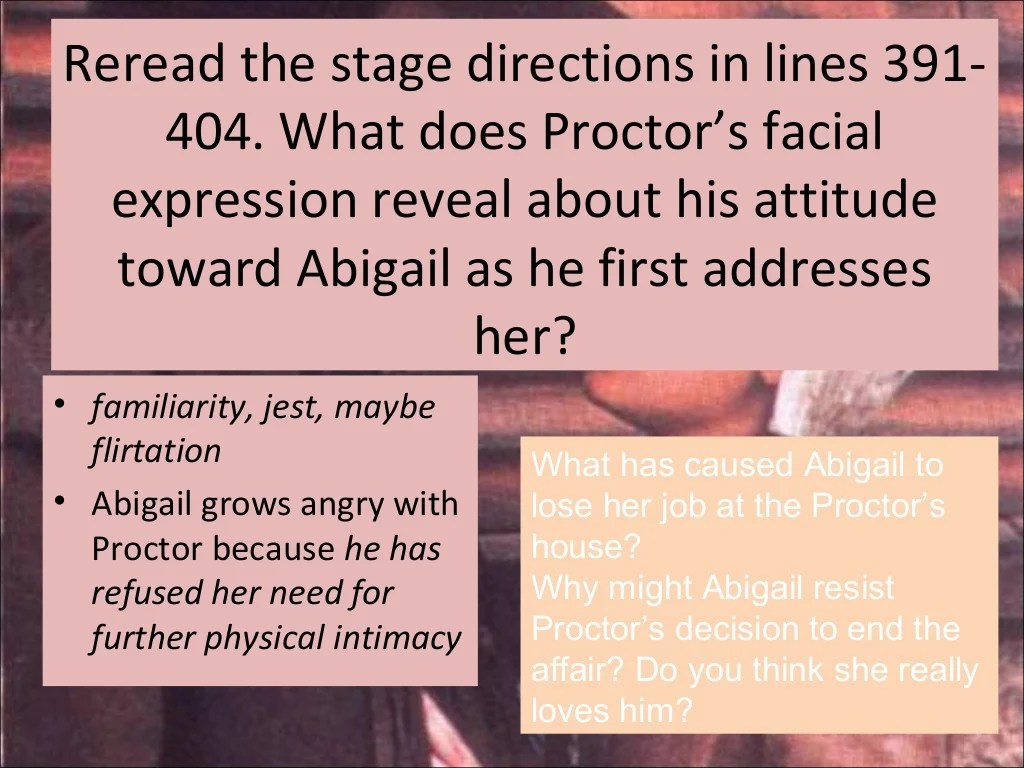
The conflict between Abigail Williams and John Proctor forms a central tension in Arthur Miller’s play, The Crucible. It is a complex and multifaceted conflict that arises from a combination of personal, social, and historical factors.
Abigail’s Motivations
Abigail’s primary motivation in her conflict with John Proctor stems from her unrequited love for him. After being dismissed from Proctor’s household, Abigail harbors a deep resentment towards him, which manifests in her determination to ruin his reputation and marriage.
In addition to her romantic desires, Abigail also seeks power and status within the Puritan community. By accusing Proctor of witchcraft, she hopes to eliminate him as a rival and gain the attention and favor of the authorities.
Conflict Within the Proctor Household: Conflicts In The Crucible Act 1
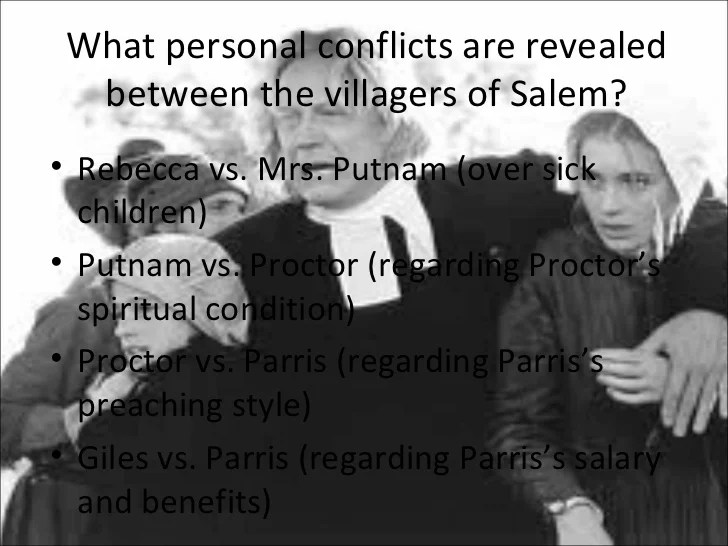
The Proctor household is a site of marital conflict between John and Elizabeth Proctor. John is a stern and unforgiving man, while Elizabeth is a compassionate and forgiving woman. Their differing personalities and values lead to frequent clashes.
Abigail Williams’ Role
Abigail Williams’ arrival in the Proctor household exacerbates the conflict between John and Elizabeth. Abigail is a young, beautiful woman who seduces John. This affair further strains John and Elizabeth’s relationship, leading to suspicion and jealousy.
The conflicts in The Crucible Act 1 are rooted in the social and religious tensions of 17th-century Salem. To understand the broader context of such conflicts, it’s helpful to examine post-World War II Europe , where similar divisions and struggles emerged.
By comparing these historical events, we can gain insights into the universal human experiences of conflict and its devastating consequences.
Impact on the Proctor Family
The conflict within the Proctor household has a devastating impact on the family. John’s affair with Abigail destroys his relationship with Elizabeth. The tension between John and Elizabeth creates a hostile and unhappy environment for their children.
Conflict Between the Puritans and the Accused
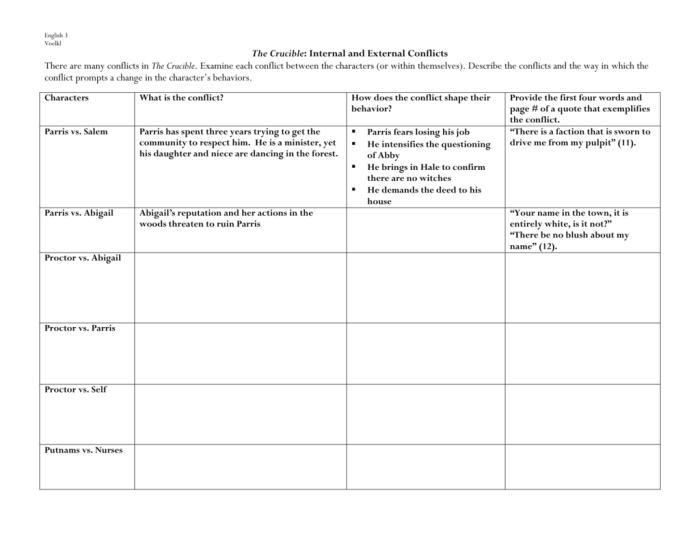
The strict religious beliefs and social norms of the Puritan community in Salem, Massachusetts, create a fertile ground for accusations of witchcraft in Arthur Miller’s play “The Crucible.”
Puritan Beliefs and Witchcraft Accusations
The Puritans believed in the literal existence of the devil and his followers, known as witches. They saw the presence of evil in the world as a constant threat, and they believed that witches could cause harm to individuals and the community as a whole.
Examples of Accusations and Trials
- Abigail Williams accuses Tituba, a slave in the Proctor household, of bewitching her and other girls in the town.
- Reverend Parris and other town officials conduct a series of trials, during which several people are accused of witchcraft.
- Mary Warren, a servant in the Proctor household, initially accuses Abigail of lying but later recants her testimony under pressure from Abigail and the court.
Social and Religious Tensions, Conflicts in the crucible act 1
The conflict between the Puritans and the accused is fueled by social and religious tensions within the community. Rivalries, grudges, and personal conflicts become intertwined with the accusations of witchcraft, creating a climate of fear and suspicion.
Conflict Between the Church and the Government
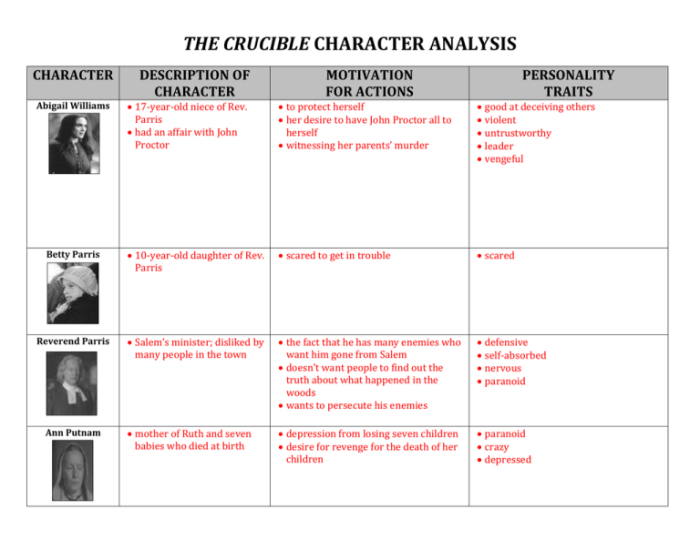
In Salem, the church played a central role in the witch trials. The Puritan society of Salem was deeply religious, and the church was a powerful institution. The ministers of the church were highly respected and had a great deal of influence over the people of Salem.
They were often the ones who first accused people of witchcraft, and they played a key role in the trials that followed.
The government of Salem generally supported the actions of the church. The magistrates who presided over the trials were often members of the church, and they relied on the ministers for advice and guidance. The government also provided the resources that were necessary to conduct the trials, such as the jail and the executioner.
Tension Between Religious Authority and Secular Authority
The conflict between the church and the government in Salem was a reflection of the tension between religious authority and secular authority that existed in Puritan society. The Puritans believed that the church was the supreme authority in all matters, both spiritual and temporal.
They believed that the government should be subordinate to the church, and that the laws of the government should be based on the laws of God.
The government of Salem, however, was not always willing to accept the authority of the church. The magistrates were often reluctant to convict people of witchcraft based solely on the accusations of the ministers. They wanted to see evidence that the accused was actually guilty of witchcraft before they would sentence them to death.
The tension between religious authority and secular authority in Salem eventually led to a breakdown of trust between the church and the government. The people of Salem began to lose faith in the ability of the church to protect them from witchcraft.
They also began to lose faith in the ability of the government to provide them with justice.
Frequently Asked Questions
What is the main conflict in The Crucible Act 1?
The main conflict in Act 1 revolves around the accusations of witchcraft and the ensuing trials, fueled by the personal vendetta of Abigail Williams against John Proctor.
How does Abigail’s desire for John Proctor contribute to the conflict?
Abigail’s unrequited love for John Proctor drives her to falsely accuse his wife of witchcraft, triggering a chain reaction of accusations and hysteria within the community.
What role does the Puritan society play in the conflicts of Act 1?
The strict religious beliefs and social norms of Puritan society create an environment where fear, superstition, and suspicion thrive, making it fertile ground for the witch trials.
